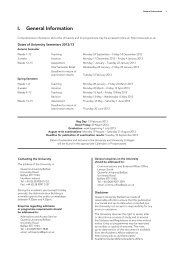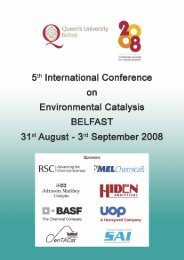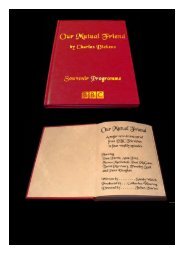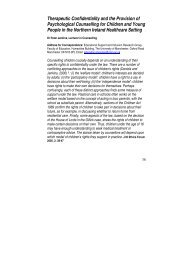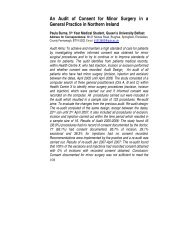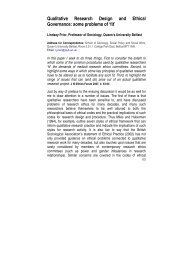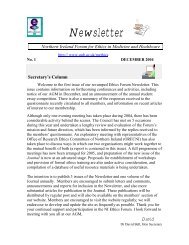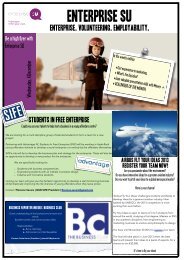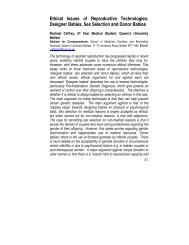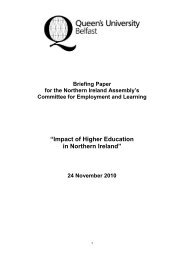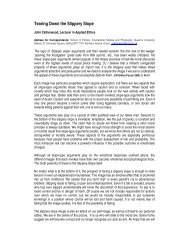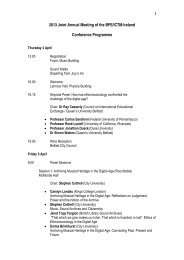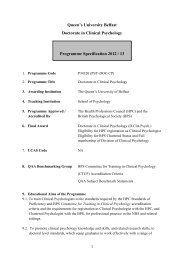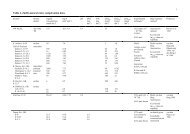Media, Politics & Conflict - Queen's University Belfast
Media, Politics & Conflict - Queen's University Belfast
Media, Politics & Conflict - Queen's University Belfast
Create successful ePaper yourself
Turn your PDF publications into a flip-book with our unique Google optimized e-Paper software.
PLEASE NOTE: <strong>Media</strong> Essay DEADLINE is Wednesday, 20 th March at 12 noon<br />
EASTER BREAK, 25 th Mar. – 12 th Apr. NO LECTURES OR TUTORIALS<br />
WEEK NINE, Mar. 15 th – 19 th<br />
TOPIC: 9/11, Iraq & Afghanistan<br />
LEARNING OUTCOMES: Students will discuss the media’s representations of the events of<br />
9/11 through the concept of media spectacle, and debate the<br />
role of the media in the conflicts of Iraq and Afghanistan,<br />
especially in regards to embedded journalism<br />
REQUIRED READINGS:<br />
1.) Kellner, Douglas, ‘9/11, Spectacles of Terror and <strong>Media</strong> Manipulation’, Critical Discourse<br />
Studies, 1(1): 41-64 [EJ]<br />
2.) Carruthers, Susan L. ‘War in the Digital Age: Afghanistan and Iraq’, Chapter 6 (pp. 209-<br />
265) in The <strong>Media</strong> at War (Houndmills: Palgrave 2011) [SL / Online (R)]<br />
WEEK TEN, Apr. 22 nd – 26 th<br />
TOPIC: The Arab Spring & New <strong>Media</strong> Technologies<br />
LEARNING OUTCOMES: Students will discuss new technologies, the internet, embedded<br />
journalism and social media to discuss the changing relationship<br />
between the media and war, with specific reference to the Arab<br />
Spring & recent global conflicts<br />
REQUIRED READINGS:<br />
1.) Alterman, Jon B. ‘The Revolution will not be Tweeted’, The Washington Quarterly, 34(4),<br />
2011: 103-16 [Online (R)]<br />
2.) Allen, Stuart, ‘Citizen Journalism and the rise of Mass Self Communication: Reporting the<br />
London Bombings’Global <strong>Media</strong> Journal,1(1), 2007: 1-20 [Online (R)]<br />
WEEK ELEVEN, Apr. 29 th – May 3 rd<br />
TOPIC: The Ethics of Reporting <strong>Conflict</strong><br />
LEARNING OUTCOMES: Students will explore the reporting of war from the journalist’s<br />
perspective, and analyse some of the dominant guidelines<br />
governing journalists in conflict situations<br />
REQUIRED READINGS:<br />
1.) Tumber, Howard, ‘Prisoners of News Values? Journalists, professionalism and<br />
identification in times of war’ Chapter 10 (pp. 190-205) in Allen, Stuart & Zelizer, Barbie,<br />
Eds., Reporting War: Journalism in Wartime (London: Routledge, 2004) [SL & Online<br />
(R)]<br />
2.) BBC, ‘Section 11: War, Terror & Emergencies’, BBC Editorial Guidelines, BBC Online 2013<br />
(available at http://www.bbc.co.uk/guidelines/editorialguidelines/page/guidelines-warpractices-accuracy/)<br />
[Online link & Online (R)]<br />
PAI1005 <strong>Media</strong>, <strong>Politics</strong> 7 <strong>Conflict</strong> (2012-13) 13



